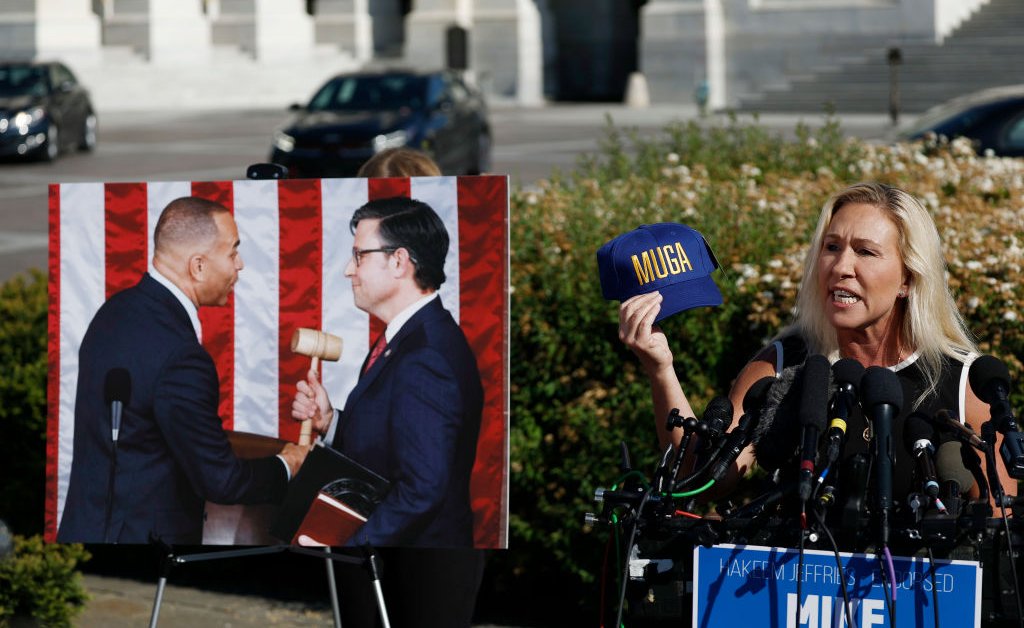We don’t need to repeat the Trump experiment
What might a second Trump presidency mean for Earth’s climate system?
Our answer to this question is based on our own experiences in climate science. We routinely use observational data, theoretical understanding, and computer models to disentangle human and natural effects on global climate. We often work in virtual laboratories, analyzing computer model simulations with and without human effects on climate.
In the counterfactual “world without us” simulations, humans do not burn fossil fuels, and do not increase levels of heat-trapping greenhouse gases in Earth’s atmosphere. Alternately, “world with us” simulations include fossil fuel burning, which adds greenhouse gases to the atmosphere and causes significant global warming.
By comparing “world with us” and “world without us” computer model experiments, we learn something valuable about the relative sizes of human and natural effects on climate. This work provides compelling scientific evidence that humans are responsible for almost all the measured global warming of nearly 1.5 degrees Celsius over the last 170 years.
That warming is on us. We are culpable.
Our political systems are also laboratories for experimentation. In 2016, the United States performed the experiment of electing Donald Trump as its 45th president. The experiment yielded significant consequences for climate policy. The U.S. withdrew from the Paris Climate Accord. Federally funded climate research at the EPA and other agencies was undermined. Regulations with direct relevance for greenhouse gas emissions — rules that governed car efficiency standards and permissible methane leakage from oil and gas production — were challenged. The social cost of carbon, a measure of the damage caused by greenhouse gas emissions, was devalued.
Repeating this political experiment by electing Donald Trump to a second term is highly unlikely to yield a different outcome. We already know how this experiment plays out. Donald Trump has given us advance notice.
He will once again withdraw the United States from the Paris Climate Accord. “Drill baby drill” will guide energy policy. Federally funded climate research will be scaled back or shut down. U.S. involvement in organizations like the Intergovernmental Panel on Climate Change will be hampered. Scientific expertise will be mocked and attacked by a self-proclaimed “very stable genius.”
It’s easy to lose sight of the seriousness of the moment. We are overwhelmed by so many other threats. Brutal, seemingly unending wars. Daily images and stories of death, suffering and starvation. Mass shootings that elicit platitudes of “thoughts and prayers” rather than solutions. The rise of populist politicians who seek to divide countries rather than unite them. Tech moguls who use their platforms for spreading viral hatred and conspiracy theories. We worry about access to food, energy, clean air and clean water. About the safety of our families. For many, the fate of Earth’s climate system is driven to secondary concern.
It should be a primary concern.
In “As You Like It”, Shakespeare famously wrote: “All the world’s a stage, and all the men and women merely players.” Human-caused climate change is an integral part of that world stage. It is the backdrop against which all significant geopolitical events of the coming century will play out. Wars and famines. International competition. Political instability. Diasporas involving millions, driven away from their homes by sea level rise, extreme heat, flooding, drought and food insecurity. This world stage will frame future history for many centuries — not just for the 21st century.
All of us have some say in whether this unfolding play — let’s call it “The Hothouse Cometh” — is a tragedy that endures for generations. Our collective choices will influence the outcome of the play. In the United States, the narrative arc of “The Hothouse Cometh” will be profoundly shaped by how we decide to vote in the 2024 presidential election.
Thus the climate consequences of repeating the “President Trump” experiment are serious. The rest of the world would receive a very clear message: “The Trump administration does not care about human-caused climate change. You should not care either. Let the climate system look after itself. Let future generations look after themselves.”
Laissez-faire, “do nothing” climate policy is a recipe for present and future climate and societal harm. The climate system will not magically self-repair if we continue to pump greenhouse gases into the atmosphere. To return to the “all the world’s a stage” metaphor, wrecking the climate stage on which all human stories are told is not a wise move. It’s a terrible move if you genuinely care about the well-being of your children and grandchildren. Or if you see the growing risks to global peace and stability if the U.S. kicks the can of climate leadership down the road while those least responsible for climate change bear the brunt of its impacts.
So before voting in 2024, consider carefully the results of the first Trump Experiment. Those results are in. They are available for all to see. A second Trump Experiment will yield a very different world from the one we currently live in.
Benjamin Santer is an atmospheric scientist who has worked on all previous Scientific Assessment Reports of the Intergovernmental Panel on Climate Change.
Henry Jacoby is the William F. Pounds Professor of Management, Emeritus, in the M.I.T. Sloan School of Management and founding co-director of the M.I.T. Joint Program on the Science and Policy of Global Change.
Richard Richels served as lead author for multiple chapters of the Intergovernmental Panel on Climate Change in the areas of mitigation, impacts and adaptation. He also served on the National Assessment Synthesis Team for the first U.S. National Climate Assessment.
Gary Yohe is the Huffington Foundation professor of Economics and Environmental Studies, Emeritus, at Wesleyan University in Connecticut. He served as convening lead author for multiple chapters and the Synthesis Report for the IPCC from 1990 through 2014 and was vice-chair of the Third US National Climate Assessment.
Copyright 2023 Nexstar Media Inc. All rights reserved. This material may not be published, broadcast, rewritten, or redistributed.
Source link


